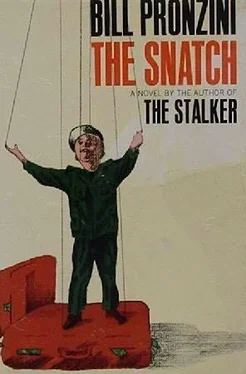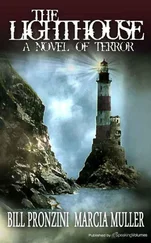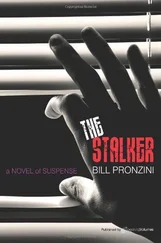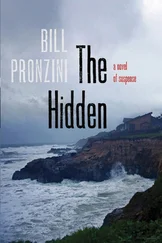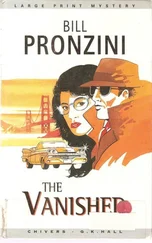Bill Pronzini - The Snatch
Здесь есть возможность читать онлайн «Bill Pronzini - The Snatch» весь текст электронной книги совершенно бесплатно (целиком полную версию без сокращений). В некоторых случаях можно слушать аудио, скачать через торрент в формате fb2 и присутствует краткое содержание. Год выпуска: 0100, Жанр: Криминальный детектив, на английском языке. Описание произведения, (предисловие) а так же отзывы посетителей доступны на портале библиотеки ЛибКат.
- Название:The Snatch
- Автор:
- Жанр:
- Год:0100
- ISBN:нет данных
- Рейтинг книги:4 / 5. Голосов: 1
-
Избранное:Добавить в избранное
- Отзывы:
-
Ваша оценка:
- 80
- 1
- 2
- 3
- 4
- 5
The Snatch: краткое содержание, описание и аннотация
Предлагаем к чтению аннотацию, описание, краткое содержание или предисловие (зависит от того, что написал сам автор книги «The Snatch»). Если вы не нашли необходимую информацию о книге — напишите в комментариях, мы постараемся отыскать её.
The Snatch — читать онлайн бесплатно полную книгу (весь текст) целиком
Ниже представлен текст книги, разбитый по страницам. Система сохранения места последней прочитанной страницы, позволяет с удобством читать онлайн бесплатно книгу «The Snatch», без необходимости каждый раз заново искать на чём Вы остановились. Поставьте закладку, и сможете в любой момент перейти на страницу, на которой закончили чтение.
Интервал:
Закладка:
The air was still warm and sweet and fresh, but it did not make me feel any better.
* * * *
3
I live in the Pacific Heights district of San Francisco, in what I think is called a Queen Anne Victorian. Old and tired and a bit frowzy, it stands with its turrets and gables proudly erect-like a tycoon’s aging mistress with no future and a million glittering memories. It had once been somebody’s fine home in the pre-earthquake days of the Barbary Coast and the Chinese tong wars, but time and the scavengers had gotten to it in the thirties and it was subdivided into three fairly large flats. In spite of its age, the location commands a high rent, and if I had not been living there for the past seventeen years under the same owner, I could not have afforded it.
It was almost six-thirty when I turned off Van Ness Avenue onto Clay Street; I had been entangled in the usual rush-hour traffic snarl on the Bayshore, immediately after leaving Hillsborough. There were no parking spaces in the vicinity of my place, not a particularly surprising occurrence, and I had to leave my car a block and a half away. It was considerably cooler in San Francisco than it had been on the Peninsula, and there was a thin, cold wind coming in off the Bay. Fog, in thick gray billows like the smoke from a rubber fire, unfolded across the darkening sky.
I walked quickly, and when I reached the foyer of my building I was winded and conscious of a muted ache in my chest. I tried not to think about that, breathing through my mouth. My mailbox contained two letters, and I put them in my pocket and climbed the dark stairs to the second floor.
The old, faded rose-colored carpet in my apartment was strewn with newspapers and package wrappings and the ashes and butts from an overturned ashtray; the remains of last night’s delicatessen supper littered the copper-topped coffee table in front of the sofa. Living alone for a long time does that to you; you get so you don’t much care if you come home to neatness or disarray, because mostly you come home alone. I had stopped picking up after myself years ago.
I went over to the thermostat and fussed with it and got some heat coming through the floor furnace. Then I crossed to the curving bay windows and pulled the curtains closed. The fog was heavy now, and I could make out only substanceless shapes in the distance; but on a clear day you could see the sailboats like idyllic toys dotting the silver-blue surface of the Bay, the long and symmetrical contours of the Yacht Harbor, the rising spans of the Golden Gate Bridge and the vast, gentle Pacific beyond.
I took a beer out of the refrigerator in the kitchen and carried it into the living room and sat down to read my mail at the tall mahogany secretary in one corner. One of the letters was a bill from a garage on Mission Street that had done some minor repairs on my car; the other was from a guy in North Carolina, with a new list of pulp magazines he had for sale.
I put the garage bill with some others in one of the pigeonholes. From a lower drawer, I got out the list I had painstakingly typed over a period of several weeks, and compared it with the items outlined in the letter from North Carolina. There were eight issues of Detective Tales, Star Detective and Clues from the 1930’s that I did not have. I sat down and wrote the guy a check and a little note to go with it. When I finished with that, I endorsed Martinetti’s check and tucked that into a bank envelope with a deposit slip, and put both envelopes into my coat pocket.
I was not particularly hungry, but I thought I ought to eat something. The refrigerator yielded a package of mortadella and some brick Cheddar cheese, and I made myself two sandwiches on sourdough French bread and ate them standing up at the sideboard. I drank the last of the beer, and then returned to the living room and kicked off my shoes and jacket and pulled down my tie and went to the bookshelves covering the side wall beyond the windows.
The shelves, which I had constructed of metal wall brackets and varying lengths of darkly laminated wood, were the only things in the apartment I made a special effort to keep in order. They contained something more than five thousand copies of detective and adventure pulp magazines dating from the late twenties through the early fifties, when the pulp market collapsed and died.
I had them segregated by title, chronologically, with the quality items like Black Mask and Dime Detective and Detective Fiction Weekly on the upper shelves, and the lesser ones-seventy-five different titles, twenty-two separate Volume One, Number 1-filling the remainder. I had turned some of them around at various points so that their covers faced into the room; they were pretty lurid, most of those covers-salivating fiends in black cloaks or scarlet robes or slouch hats, clutching huge automatics or gleaming daggers; half-nude girls with too-red lips screaming in agony or fear or perhaps even ecstasy-but I liked the effect they gave that staid rose-papered high-ceilinged room. It made the whole setting seem impressionistic, somehow, like a pop-art display.
I had been collecting pulp magazines for twenty-five years, and it was the one consuming passion I had in life. I had grown up on the fringe of the Mission District during the Depression, in a neighborhood not good but not bad, not poor but not well-to-do, and every spare nickel and dime I could cadge or earn went for pulps from the time I was twelve years old. I had stacks of them in the basement storage room of our building, which my mother later gave to the Goodwill without my permission, and I would spend hours in my room or in the basement reading Black Mask and the other detective magazines instead of studying.
The pulps fascinated, captivated, me. I couldn’t get enough of them. I went to the City College of San Francisco after I graduated high school, and quit after three semesters because the pulps got in the way of my studying and I wouldn’t give them up. I went into the Army shortly after that, and until the war broke out I had this soft assignment in Texas as the private chauffeur to a major who was sleeping with half the girls in the nearby town and trying to get next to the other half. I had plenty of time to read, and to plan what I was going to do when I got out of the service; there was a natural fusion of the two after a while, and I knew I was going to go into police work. I had admired the champions of justice that Chandler and Hammett and the other pulp authors wrote about for a long time, and the kind of job they were doing was the kind of job I wanted to do myself.
After Pearl Harbor, I was sent to the South Pacific, and while I was in Hawaii I applied for a position with Military Intelligence. Eventually I passed enough tests to get me into a security unit. I saw no real action, but I learned police work the way the Army teaches it.
I came out late in 1945, after Hiroshima, and when I returned to San Francisco I took the Civil Service exams. In 1946 I went into the Police Academy; I thought I was pretty hot-shot in those days, and I made no secret of the fact that I was both a voracious pulp reader and a self-proclaimed world-beater who was going to set the department on its ear once I got into uniform.
Most of the guys I went through the Academy with thought I was some great fun. They kept pulling gags on me, and calling me “Philip” and “Sam” and “Nick” and “Nero.” There was this one in particular, a sort of dour-faced type named Eberhardt, who used to ride me mercilessly, until one day after a drill I took all I was going to take and hit him flush in the mouth. We became good friends after that, the way guys will sometimes after such incidents.
It did not take me long, after I was on the force, to learn that real police work is little more than routine and hard work, pain and suffering, long hours and damned little money, so that you had to fight a constant internal battle to maintain your honesty and your integrity. It was all of those things, and a lot more, but even after I matured and realized and accepted the fact that I wasn’t going to set the world on fire, I stuck it out; I stuck it out for fifteen years, because I believed then-and I still believe now- that the prevention of crime and the interests of justice and the law are of vital and immediate concern.
Читать дальшеИнтервал:
Закладка:
Похожие книги на «The Snatch»
Представляем Вашему вниманию похожие книги на «The Snatch» списком для выбора. Мы отобрали схожую по названию и смыслу литературу в надежде предоставить читателям больше вариантов отыскать новые, интересные, ещё непрочитанные произведения.
Обсуждение, отзывы о книге «The Snatch» и просто собственные мнения читателей. Оставьте ваши комментарии, напишите, что Вы думаете о произведении, его смысле или главных героях. Укажите что конкретно понравилось, а что нет, и почему Вы так считаете.
